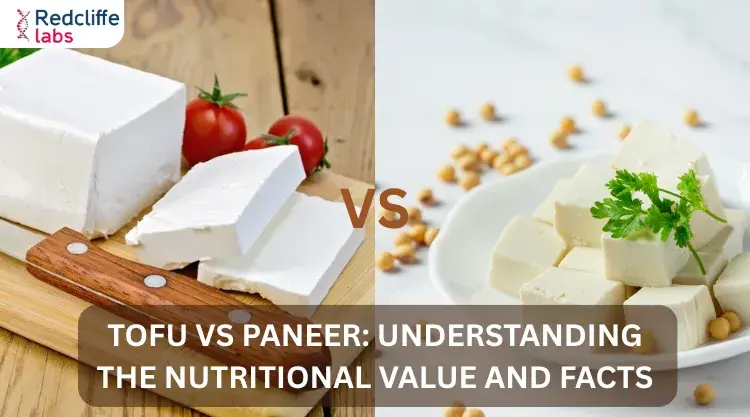How Much Protein in 100 gm Soya Chunks?

Medically Reviewed By
Dr. Ragiinii Sharma
Written By Sheena Mehta
on Aug 21, 2024
Last Edit Made By Sheena Mehta
on Jul 19, 2025

Introduction
A few plant foods, like soya chunks, garner much respect and admiration in the world of nutrition. Also regarded as "vegetarian meat," soya chunks are small, textured nuggets that pack a powerful nutritional punch because of their protein content. As a result, they have become a staple diet for people looking for protein-rich alternatives to animal foods. Today’s blog is a comprehensive guide, and we'll take a deep dive into the world of soy chunks, discovering their nutritional benefits, the importance of their protein content, and how you can smoothly incorporate them into a balanced diet. This blog is your ultimate resource for a health-conscious person, a fitness freak, or someone anxious about plant-based nutrition.
Soya Chunks Nutritional Value
Soya beans are one of the most protein-rich legumes on the market. They are the source of soya chunks, also known as textured vegetable protein (TVP). The defatted soy flour is processed into granules or chunks during soybean oil extraction, resulting in soya chunks. The end product is a food item high in protein and low in fat and carbohydrates, making it an adaptable ingredient for various dishes.
The dietary benefit or nutritional value of soya chunks relies on many factors. These include the brand, method of preparation, etc. A well-known brand of soya chunks in India contains the following nutrient values:
100-gram soya chunks protein value, and other nutrients are as follows:
| Unlocking the Nutritional Information of Soy Chunks | |
| Protein | 52 grams |
| Fiber | 13 grams |
| Calories | 345 kcal |
| Sugar | 33 grams |
| Fats | 0.50 grams |
| Calcium | 350 milligrams |
| Iron | 20 milligrams |
Understanding Soya Chunks Nutritional Value
- The protein content of 100 grams of soya chunks is higher than that found in 200 grams of chicken or 250 grams of eggs.
- The significant number of calories in 100 grams of soya chunks should be eaten proportionately to obtain benefits.
- Compared to chicken and eggs, 100 grams of soya chunks have a lower fat content.
- The calcium content in soya chunks adds up to 35% of the daily recommended value.
- Soya chunks contain about 20 milligrams of iron and vitamins such as A and C.
Hence, this makes soya chunks an excellent option for vegetarians and vegans who want to fulfil protein deficiency in their bodies without consuming animal products.
5 science-backed reasons underline the importance of protein:
Protein is essential for everyone. It is important to maintain overall health. Here are some science-backed reasons why it is important to eat protein:
- Protein is the building block of skin, cartilage, bones, and muscles.
- Individuals taking more protein tend to maintain bone mass better as they age.
- A high protein intake can boost metabolism and increase fat burning.
- Some studies demonstrate that high protein intake can lower blood pressure, thus minimising the risk of heart attacks, strokes, and chronic kidney health conditions.
- Eating more protein during an injury can help reduce muscle loss and accelerate the recovery process.
Soya Chunks: A Great Source of Protein
Soya chunks provide total protein, which implies that they contain all nine essential amino acids that the body can't produce alone and should be obtained through the diet. Most plant-based proteins are incomplete protein sources. They should be combined with different protein sources to ensure a total amino acid profile.
The high protein content of soya chunks contributes to muscle repair and growth and overall health and well-being. Protein obtained from soya chunks is easily digestible. Consuming soy-based proteins can reduce cholesterol levels, preventing coronary illness. Furthermore, soy protein contains less saturated fat, making it a heart-healthy choice.
Soya Chunk Benefits: 6 Health Benefits of Eating Soya Chunks
Do you know that including soya chunks in your diet can offer numerous benefits you are aware of? Let’s discover some of the health benefits that soya chunks offer beyond their impressive protein content:
- Supports Weight Management Plan: Soya chunks are rich in protein and fiber, which help promote feelings of fullness. Hence, they are an excellent option for a weight management plan.
- Improves Heart Health: Soya chunks contain beneficial compounds like isoflavones and are low in saturated fat, which contributes to improved heart health.
- Reduces the Risk of Osteoporosis: Soy is also rich in isoflavones, which help prevent bone loss, particularly in postmenopausal women. This can minimize the risk of osteoporosis and bone-related illnesses.
- Regulates Hormonal Balance: The phytoestrogens in soy are beneficial for regulating hormonal balance in women.
- Reduces the Risk of Certain Cancers: Studies reveal that consuming soy products regularly, such as soy chunks, may contribute to lowering the risk of breast and prostate cancer.
- Supports Overall Gut Health: Soy chunks are an excellent source of dietary fiber. Thus, it enhances digestive wellness, which means healthy digestion and regular bowel movements, and prevents constipation.
Also read: https://redcliffelabs.com/myhealth/gut-health/best-foods-to-improve-your-gut-health/
6 Different Ways to Incorporate Soya Chunks into Your Diet
After exploring the myriad benefits of soya chunks, below are different ways to incorporate them into your diet. Fortunately, rich in protein, soya chunks are an incredibly versatile food. Let’s discover how you can use them in dishes in detail.
- Add them to curries and stir-fries to enhance protein intake. Soy chunks can absorb flavours well, making them an excellent substitute for meat in dishes like chilli curry or stir-fry.
- Salads: Use soya chunks to make a protein-packed salad. Mix them with fresh vegetables, greens, and your favorite salad dressing.
- Soups: Make a quick and healthy soya chunks of vegetable soup to increase protein.
- Pasta Sauces and Rice Dishes: Soya chunks are a healthy meal. Mix soya chunks into pasta sauces or rice dishes for a complete meal and relish your taste buds.
- Snacks: Boil and season soya chunks with your favorite spices to make a high-protein snack. You can also roast soya chunks for a crunchy, nutty, and satisfying treat.
- Burgers and Patties: Replace meat with soya chunks and mix them with spices, vegetables, and breadcrumbs to create a delicious vegetarian burger or patties.
Conclusion:
From the above information, it is clear that soya chunks are a nutritional powerhouse. Their high protein content, numerous health benefits, and complete amino acid profile make them well-deserving of a balanced diet.
Protein-rich soy chunks are a versatile option for losing weight, gaining muscle mass, or relishing a heart-healthy meal. Choose them to support your health and contribute to a more sustainable food system.
Frequently Asked Questions (FAQs)
1. What are the three benefits of eating 100 grams of soya chunks daily?
100 grams of soya chunks contain approximately 52–54 grams of protein, which can offer several health benefits:
- They can provide essential amino acids needed for muscle growth and repair.
- The soya chunk protein promotes satiety, which helps you feel fuller for longer periods.
- Regular consumption of soya chunks can reduce the risk of bone-related illnesses.
2. Is it true that soy chunks are a complete meal?
Yes. Soya chunks are a complete meal. They are loaded with all nine essential amino acids that your body can’t produce alone.
3. How much protein is in soy chunks?
On average, 100 grams of soya chunks contain 52 grams of protein.
Leave a comment
2 Comments
Navneet Kumar
Jul 9, 2025 at 2:51 AM.
Does Soya Protein having Purines in it increase Uric Acid in blood ? Any studies or research done to support reply
Myhealth Team
Jul 9, 2025 at 10:41 AM.
Yes, soy protein contains purines, which can increase uric acid levels if consumed in excess. However, studies show that plant-based purines (like those in soy) have a milder effect compared to animal sources. Moderate intake of whole or fermented soy products is generally safe, but those with high uric acid or gout should avoid concentrated soy protein supplements and consult a doctor.
Sapna gupta
Aug 31, 2024 at 1:18 PM.
Very good information,thanks
MyHealth Team
Sep 7, 2024 at 6:43 PM.
We are glad you found the information helpful. If you have any more questions, feel free to ask!



